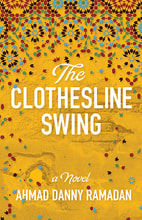Ahmad Danny Ramadan's The Clothesline SwingReviewed by Rhonda Dynes
|
|
What is a motherland? What is a mother? What is our land? What does it mean to have a mother, to be from a mother? To have this motherland? To be mothered? And how do these mothers teach us to love? And what do they teach us about love anyway? The narrative of Syrian refugee and Vancouverite Ahmad Danny Ramadan’s first novel, The Clothesline Swing, engages with these questions again and again, surrounding each answer with even more questions. Taking each gentle step through both question and tentative answer, Ramadan suffuses his story with his uncanny comprehension of love and loss and of the precarious links between motherhood and selfhood. Ramadan’s work is an unforgettable elegy to the fragile sense of self, family and homeland that, at times, seems out of reach for all of us.
Hakawati (which means ‘storyteller’ and is the only name we get for the novel’s main character) begins the main throughline of the story by revealing that his partner of many years is dying of an unnamed illness, perhaps cancer. His grief comes to the foreground as he tries to deal with the impending death by spending his days nursing and telling stories while remaining in their lush Vancouver home. It is in this house where memories of the past and present coalesce. As Hakawati attempts to spend his last moments with his partner, he must also try to placate Death, who has come to take Hakawati’s partner from him. Hakawati attempts to assuage Death the only way he knows how, with stories, memories and tales, in a direct homage to One Thousand and One Nights, the Arabic collection of Middle Eastern folktales. Like Scheherazade (a name that can mean ‘noble lineage’), Hakawati sees his own stories, those of his life and those he has read and heard, as a type of drug or panacea meant to keep Death away or at least hold him back as long as possible. As both lovers come to terms with death/Death, their intimate relationships with other men, the violence they suffered for those relationships coupled with the violence that surfaces in their families and their home country are also reconciled. In one early moment in the story, Hakawati considers the various ways he might waylay Death and ends up realizing that all his stories lead to an ultimate realization: |


